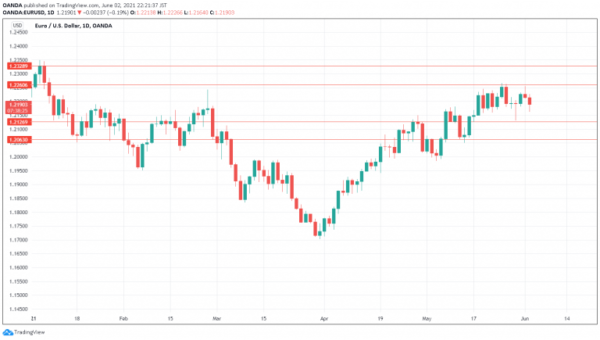The euro is down for a second straight day. In the North American session, EUR/USD is trading at 1.2180, down 0.28% on the day.
Germany Retail Sales slides
German consumers held tightly on the purse strings in April, as Retail Sales fell by 5.5% (MoM). This slide was much worse than the estimate of -2.0% and was a sharp downturn from the previous read of +7.7%.
On an annual basis, Retail Sales looked better, with a gain of 4.4%. Still, this missed the consensus of 10.1% and the gain is somewhat deceptive, as it is in comparison with Retail Sales from a year ago, at the height of the corona pandemic.
We’ll get a look at eurozone retail sales for April on Friday. Like in Germany, the eurozone is expected to have contracted in Q1, with a consensus of -1.2% m/m. However, on an annualised basis, the forecast stands at 25.5%, as consumer spending is projected to have surged since the dark days of Covid in 2020.
With major economies reopening, inflation has become a buzzword that investors and central banks are paying very close attention. In the US, a surge in April CPI provided the US dollar with a brief boost. In the eurozone, inflation is also on the move. CPI flash inflation hit 2.0% y/y in May. This was higher than the 1.6% y/y in April and the highest level in 2018. Core inflation rose to 0.9% y/y in May, up from 0.7% previously.
Although these inflation figures are higher, the ECB, similar to the Fed, is likely to stick to its well-rehearsed script that higher inflation is transient. This means that the ECB is unlikely to adjust its inflation forecast at next week’s policy meeting.
EUR/USD Technical
- EUR/USD faces resistance at 1.2260. Above, there is resistance at 1.2329
- On the downside, there is support at 1.2127, followed by 1.2063
